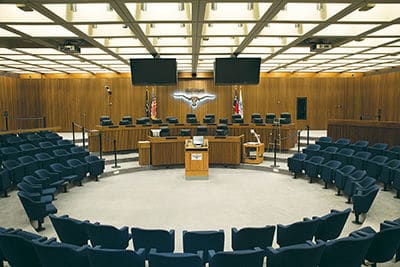Council Report
FW council won’t join SB 4 lawsuit challenge
Rick Mauch
FWBP Correspondent
The city of Fort Worth will not be joining the fight against Senate Bill 4 (SB 4), otherwise known as the “sanctuary cities” bill.
After a marathon meeting that lasted into the early morning of Aug. 16, the city council voted 5-4 against joining Dallas, Austin, San Antonio and Houston in challenging SB 4 as unconstitutional in a consolidated lawsuit pending in the Federal District Court for the Western District of Texas.
The proposal was brought by recently elected Councilman Carlos Flores with support from District 9 Councilwoman Ann Zadeh, District 8 Councilwoman Kelly Allen Gray and District 5 Councilwoman Gyna Bivens.
The Legislature approved SB 4 on May 3 and Gov. Greg Abbott signed it into law on May 7. The law goes into effect on Sept. 1.
The law prohibits city officials and law enforcement officials from adopting, enforcing or endorsing a policy or a practice that would prohibit or materially limit the enforcement of immigration laws.
“We must challenge it. That is part of our prerogative at local lawmakers,” Flores told his fellow council members before the vote. “Our own police department has stated this law will erode community trust. This law will be injurious to the entire body of the city of Fort Worth.”
“For me, urging the City Council to vote on joining litigation for SB4 came down to the impacts that this will cause with law enforcement. Like our police chief, I believe that this new law will likely lead to mistrust of FWPD officers and law enforcement and will negatively impact our efforts to foster a strong sense of community in many of our diverse neighborhoods,” he said. “Law enforcement considers SB4 a burden on their officers and a negative impact on crime investigations. SB4 also unlawfully limits the authority of home-rule cities to properly allocate their limited public safety resources. Voting to join the litigation against SB4 was the necessary next step in our democratic process and sends the right message.”
Zadeh called SB 4 “the single biggest attack on local control in the state of Texas” and “the greatest overreach in the history of Texas.”
“We should all continue to fight and I’m incredulous as to why we are not,” she said.
“We tell everybody we are a compassionate city. We boast about our compassion,” Gray said. “It’s time for us to put our big girl panties on.”
Bivens said, “There’s a whole different perspective when you know what it’s like to be followed in a department store.”
Council members who voted against joining the lawsuit agreed they were doing so because they swore to uphold the law and said they are seeking an alternative plan to deal with problems that might arise after SB 4 becomes law.
“It’s not a perfect bill by any measure, but on Sept. 1 it will be the law,” District 7 Councilman Dennis Shingleton said, adding that choosing which laws to uphold could lead to “a march down the road to anarchy.”
Recently elected District 3 Councilman Brian Byrd cited concerns over the fate of state and federal grant applications should the city join the lawsuit.
“Can anyone predict what this Trump administration will do?” he asked.
Byrd also noted, “The undocumented population here are good people. They’re looking for a better life. They’re the kind of people I want as my neighbor.
“Tonight is not a vote on whether or not we are racist. We do not tolerate racism in any way.”
Mayor Betsy Price opposed joining the lawsuit, saying the debate should be a federal issue that has been undeservedly sent down to the local level. She said her decision was based on what she believes is best for the entire city.
“I’m the one who represents all 854,000,” Price said, adding that Fort Worth has nothing to gain by supporting the lawsuit.
“I believe it’s more constructive for us to work together on a long-term game plan,” she said. “Fundamentally, it doesn’t change the fact the Fort Worth Police Department is here to serve everyone.”
The council also heard from 88 people addressing whether to join the lawsuit.
Under SB 4 local authorities must let officers investigate the immigration status of every person who is lawfully detained or arrested, except in limited situations, or help/cooperate with federal immigration officers in such situations. Any person in custody must produce a Texas driver’s license or “similar government-issued identification” to avoid extended detention for purposes of an immigration status check if required.
In short, the law amounts to a “show me your papers” action, opponents of the law said.
The law contains several enforcement provisions and stiff civil penalties for violations. The state can impose fines if any municipal officer or employee fails to comply, and these can be up to $25,500 for each day of noncompliance after the first day.
If a police chief or sheriff refuses to comply with SB 4, he or she is subject to criminal prosecution for a Class A misdemeanor. If an elected or appointed official refuses to comply with SB4 – for example, by endorsing a policy that would limit the enforcement of federal immigration law – he or she can be removed from office.
The lawsuit argues that SB 4 raises many constitutional issues, including the First Amendment rights of elected and appointed officials because it chills policy dissent. It is also contends that the law enables unconstitutional searches, seizures and detentions of U.S. citizens.
Opponents of SB 4 also labeled it as defective because they say it unlawfully limits the authority of home-rule cities to effectively manage and direct their limited public safety resources so as to protect the public. They say it infringes on the constitutional and civil rights of city elected and appointed officials, along with citizens and residents.






